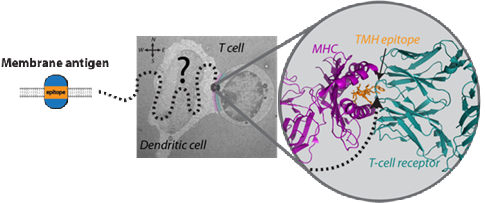Research Highlight
Dr. Frans Bianchi

For the immune system to eradicate pathogens and cancer cells, T-cells have to recognize peptides (epitopes) derived from these threats. Antigen-specific T-cells are activated by dendritic cells and macrophages, which ingest pathogens and cancer or infected cells and present peptides derived from these antigens on their cell surface in protein complexes called major histocompatibility complexes (MHC). Membrane-proteins are a relatively over-presented source of antigen peptides[1], and many well-known and clinically important MHC epitopes stem from transmembrane helices[2]. Given that MHC presentation forms the basis in vaccination, knowing what peptides are presented by an individual’s MHC repertoire is crucial for designing vaccines, since highly presented peptides have a better chance of activating T-cells and thus initiating an effective immune response. However, determining how transmembrane helices are extracted and processed for MHC presentation is challenging as our current mechanistic knowledge is based on soluble proteins, we developed membrane protein reporter systems to study this.
1 Bilderbeek R, Baranov M, van den Bogaart G & Bianchi F (2022) Transmembrane helices are an overlooked and evolutionarily conserved source of major histocompatibility complex class II epitopes. Frontiers in Immunology 12: 763044; DOI: https://doi.org/10.3389/fimmu.2021.763044
2 Bianchi F, Textor J & van den Bogaart G (2017) Transmembrane helices are an overlooked source of Major Histocompatibility Complex class I epitopes. Frontiers in Immunology 8: 1118; DOI: https://doi.org/10.3389/fimmu.2017.01118
| Last modified: | 13 October 2023 09.24 a.m. |
